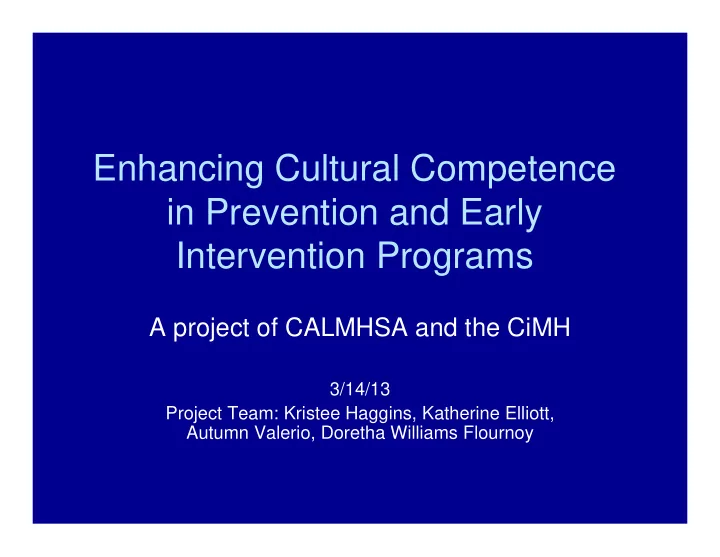

Enhancing Cultural Competence in Prevention and Early Intervention Programs A project of CALMHSA and the CiMH 3/14/13 Project Team: Kristee Haggins, Katherine Elliott, Autumn Valerio, Doretha Williams Flournoy
Project Overview Project Development Project Goals: – To conduct an assessment to identify challenges in reaching and engaging ethnic and cultural minority communities. – To develop technical assistance recommendations that will support program partners in enhancing efforts towards these communities. Two Phases: – Needs Assessment – Technical Assistance
Needs Assessment: Theoretical Foundation Siegel, C. E., et al. (2011). The Nathan Kline Institute Cultural Competency Assessment Scale: Psychometrics and Implications for Disparity Reduction. Ton, H., et al. (2011). Providing Quality Health Care with CLAS: A Curriculum for Developing Culturally and Linguistically Appropriate Services. Office of Multicultural Health, CA DMH and DHCS. Harper, M., et al. (2006). Organizational cultural competence: A review of assessment protocols. Louis de la Parte Florida Mental Health Institute, Research & Training Center for Children ’ s Mental Health. National Standards on Culturally and Linguistically Appropriate Services (CLAS) Cultural Competence Plan Requirements
Needs Assessment: Areas of Focus 1. Organizational values/policies 2. Evaluation/monitoring 3. Communication and language access 4. Workforce diversity 5. Community/consumer participation 6. Facilitation of a broad service array 7. Organization resources *Harper, M., et al. (2006). Organizational cultural competence: A review of assessment protocols (Making children ’ s mental health services successful series, FMHI pub. no. 240-2).
Needs Assessment: Protocol 1. Review of program partner materials: Scope of work Quarterly report Deliverables, outreach fliers, websites, etc. RAND “ get to know you ” documents 2. Interview 3. Online survey 4. Summary and recommendations for technical assistance
Emerging Themes: Strengths – Program partners generally were positive and proactive about collaboration in needs assessment – Specific strengths varied widely among partners and included: commitment to cultural competence history of immersion in communities development of partnerships to enhance work with ethnic and cultural minorities
Emerging Themes: Areas for Growth Community Engagement – Identifying target communities – Identifying community resources, organizations, leaders – Connecting with local and statewide ethnic minority leaders and advocates – Building new relationships, sustaining relationships Understanding the Impact of Culture – Impact of culture on stigma, SMH, suicide? – Evaluation of cultural responsiveness – Findings of CRDP
Partner TA Requests – Training/education about culture: Best practices for ethnic/cultural minorities How does culture affect stigma, suicide, SMH Evaluation of cultural competence – Community engagement: Asset mapping Identification of community partners Facilitation of relationships – Translation Funding Assistance with process of translation
Potential Format for TA – Webinars: didactic presentations about: Cultural differences in stigma, suicide, and SMH Best practices with minority communities CRDP findings Evaluation strategies – Collaborative conferences Program partners may be grouped to participate in conferences and be connected with ethnic and cultural community experts and advocates – Learning communities Program partners may participate in work groups to discuss challenges and lessons learned in conducting outreach and engaging marginalized communities
Next Steps Finalizing Brief Reports for program partners Overall Findings Report Technical Assistance: 2013-2014 Discussion
Questions? Contact Information: Katherine Elliott (916) 743-5541 kagelliott@gmail.com Autumn Valerio (916) 379-5302 avalerio@cimh.org Kristee Haggins (916) 379-5338 khaggins@cimh.org
Recommend
More recommend